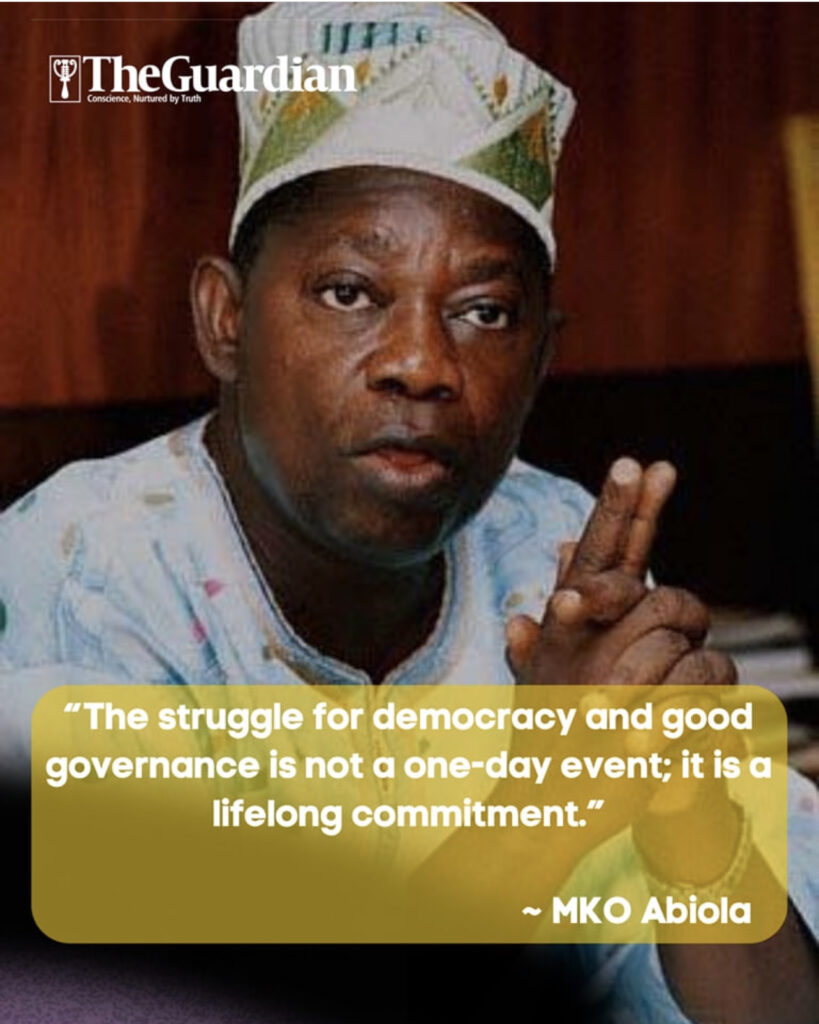June 12th holds profound significance for every Nigerian. It is a day not just for celebration, but for solemn reflection on the nation’s arduous journey towards democratic governance. As Nigeria commemorates Democracy Day this year, the powerful words of Chief MKO Abiola resonate deeply: “The struggle for democracy and good governance is not a one-day event; it is a lifelong commitment.”

This timeless quote serves as a crucial reminder of the continuous dedication required to uphold the ideals of freedom, justice, and effective leadership.
Why June 12th Matters: A History of Sacrifice
For years, May 29th was recognized as Nigeria’s Democracy Day. However, in a significant shift in 2018, the Nigerian government officially declared June 12th as the authentic date. This change was a poignant acknowledgement of the 1993 presidential election, widely regarded as the freest and fairest in Nigeria’s history. Despite its integrity, this election, presumably won by MKO Abiola, was tragically annulled by the military regime of the time.
The annulment ignited widespread protests and a prolonged, often brutal, struggle against military dictatorship. Many patriots lost their lives, and countless others, including Abiola himself, endured imprisonment. Abiola ultimately paid the ultimate price for his mandate, becoming a martyr for Nigeria’s democratic aspirations. Therefore, June 12th is more than a public holiday; it’s a sacred day of remembrance for those who bravely fought and sacrificed for the democratic freedoms Nigerians cherish today.
MKO Abiola’s Enduring Vision: Beyond the Ballot Box
MKO Abiola’s impactful quote perfectly encapsulates the very essence of Nigeria’s democratic evolution. His life, marked by extensive philanthropy and an unwavering stance against oppression, embodies the spirit of a “lifelong commitment.” He possessed a clear understanding that genuine democracy transcends mere voting; it demands active citizen participation, accountability from leaders, and a relentless pursuit of good governance that genuinely benefits all segments of society.
His vision for Nigeria was ambitious and transformative: a nation free from poverty, where education was universally accessible, and its immense potential fully realized. This enduring vision continues to serve as a beacon, constantly reminding us that democracy is fundamentally a means to an end – a better, more equitable life for every Nigerian.
The Ongoing Imperative: Sustaining the Struggle for Good Governance in Nigeria
While Nigeria has undeniably made significant strides since its return to civilian rule in 1999, Abiola’s words remain profoundly relevant. The “struggle for good governance” is, indeed, an ongoing, lifelong commitment that requires concerted effort from all stakeholders. Key areas demanding continuous attention include:
- Active Citizen Engagement: Nigerians must remain actively involved in the political process, holding their elected officials accountable, demanding transparency, and advocating for policies that foster progress and equity.
- Strengthening Democratic Institutions: The bedrock of any stable democracy lies in robust, independent institutions – including the judiciary, electoral bodies, and anti-corruption agencies. These must be continually empowered to safeguard democratic principles and ensure justice.
- Eradicating Corruption: Corruption remains a formidable obstacle to sustainable development and effective governance in Nigeria. A united, sustained national effort is crucial to dismantle this menace at all levels.
- Promoting Inclusivity and National Unity: True democracy thrives on diversity and inclusion. Conscious efforts are needed to bridge societal divides and ensure that all voices, irrespective of background, are heard and adequately represented.
- Economic Development and Social Justice: Good governance must translate into tangible improvements in the daily lives of ordinary Nigerians. This includes addressing critical issues such as poverty reduction, job creation, and ensuring equitable access to quality healthcare and education.
Commemorating Democracy Day 2025: A Renewed Call to Action
As we commemorate Democracy Day on June 12, 2025, let this not be merely an observance of a public holiday. Let it be a powerful, renewed call to action for every Nigerian. Let us internalize MKO Abiola’s profound message and collectively recommit ourselves to the ongoing struggle for a truly democratic and well-governed Nigeria.
This means:
- Deepening our understanding of Nigeria’s democratic history and the critical importance of active, informed citizenship.
- Actively participating in civic processes, from local community initiatives to national elections, ensuring our voices are heard.
- Advocating tirelessly for reforms that strengthen democratic institutions, promote transparency, and uphold the rule of law.
- Demanding accountability from our leaders and actively engaging in constructive public discourse.
- Upholding the fundamental values of peace, unity, and justice – cornerstones of any prosperous and thriving democracy.
Nigeria’s democratic journey has been characterized by challenges and triumphs. It is a testament to the resilience, determination, and unwavering spirit of its people. By embracing the ethos of “lifelong commitment” championed by MKO Abiola, we can collectively work towards building a Nigeria where democracy genuinely delivers on its promise of a brighter, more prosperous future for all its citizens.









Add Comment